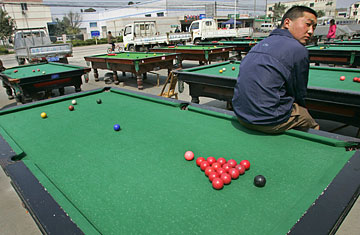
Open Season
Snooker is increasingly popular in China, played even outdoors
In front of what looks like a warehouse in an industrial zone in Chelmsford, a commuter town 30 miles (48 km) northeast of London, an electricity generator is billowing smoke. In the adjacent building, Ali (The Captain) Carter, 28, is sitting by the bar, seemingly unfazed by the power cut that has plunged his snooker club into semidarkness. It's 10 a.m. on a Friday and a group of old-timers continue their game, playing by the midmorning sunlight that dapples the table nearest the windows.
With no tournaments, the summer used to be an enforced holiday for the professional players, but not this year. Carter, ranked seventh in the world, had just returned from China as victor of the Huangshan Cup and a few days later would pack his cue again, this time for Nanjing to compete in the Jiangsu Classic. Like many of those on the snooker circuit, most of them from Britain, he struggles with jet lag on the China trips and isn't keen on the local food. But he's as stoic about it as he is about the faulty generator. "[China's] where the game is popular and that's where the money is," says Carter. "And I try and stick with Western-style food anyway."
China's interest in snooker was seeded when promoter Barry Hearn toured with the stars of the game's heyday in the mid-1980s and Guangzhou hosted the first ranking event in China in 1990. Today, three of the tournaments in China are staged by the sport's governing body, World Snooker. "China is the most vibrant area of growth right now," says Ivan Hirschowitz, a World Snooker spokesman. "What's happening there is fantastic." All world-ranking events are shown live on TV in China, adding up to 250 hours of televised snooker last season. But it's the emergence of a new generation of homegrown talent that has sparked an explosion in interest. Four Chinese players made it to the last 32 at the world championships this year. Ding Junhui, who won the Jiangsu Classic on June 8, is mobbed wherever he goes. When the "Star of the East," to use his snooker sobriquet, won the China Open two days after his 18th birthday in 2005, 110 million watched on TV. By these figures, for any sport that wants to develop, an obsessive Chinese fan base makes a lot of financial sense.
What began as a monsoon-season diversion around 1875 in the British officers' mess in Jabalpur in colonial India spread to the gentlemen's clubs, then to the working men's clubs of Britain and the English-speaking corners of the Commonwealth. It was popularized and dominated in the 1930s and '40s by Joe Davis, who would pack theaters like the London Palladium for exhibition games with a 20-ft (6 m) mirror suspended above the table for the audience to share the marvel. But obscurity followed, and snooker retreated to backstreet clubs, finding solace amid drinkers and gamblers.
Which is where David Attenborough, who was then a top official at the BBC, found it. He saw snooker, with its colored balls and green baize, as the perfect format to exploit the new color TV technology and launched the show Pot Black in 1969. By the world championship final in 1985, snooker was more popular than perms and shoulder pads. When Dennis Taylor sank the final black of the final 35th frame to win the trophy over Steve (The Nugget) Davis, after two days of play, it was 12:19 a.m. on Monday and 18.5 million Brits were still glued to their sets, the greatest ever TV audience for a sporting event in Britain at the time.
But the future is Asia, and particularly China. It's estimated that 50 million people now play snooker in China, and Beijing alone has 300 snooker halls, so it's only a matter of time before a Chinese world champion emerges. Ding is favored to be the first, and he has relocated to Sheffield, England, home of the World Snooker Academy, in pursuit of his goal, although apparently he misses his mother's huo guo (hot pot). "I had never cooked for myself before ... When I tried to cook Chinese food it was inedible," Ding told the British daily the Independent. "Snooker's in a good place now," says Carter as the lights come flickering back on in his club. "There are sponsors, tournaments in China, prize money is on the up and it's on TV." And maybe a bowl of home-cooked huo guo could make those China trips all the more enjoyable.